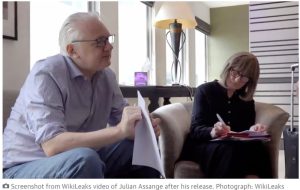The most telling thing in Dermot Ahern‘s statement in the article is the phrase "While not seeking to interfere with the statutory independence of the National Pensions Reserve Fund (NPRF) Commission…". What this means is that anything that appears in this article has absolutely no statutory effect. It is merely fudge.
The most telling thing in Dermot Ahern‘s statement in the article is the phrase "While not seeking to interfere with the statutory independence of the National Pensions Reserve Fund (NPRF) Commission…". What this means is that anything that appears in this article has absolutely no statutory effect. It is merely fudge. The Govt, if it is serious on the matter in the run-up to the May ‘Cluster Bombs’ Conference, will have to pass legislation to outlaw this kind of investment, which will apply to the NPRF Commission and to everyone else. While they’re passing such legislation, they can also pass the major piece of necessary legislation, banning Irish involvement in everything to do with cluster munitions.
Government Ministers, like the rest of us, have to observe the law. The present law states that the NPRF is completely independent of Govt. Until another law banning investment in clusters is passed, nothing that Cowen or Dermot Ahern say, and least of all the headline, is worth a fiddler’s. What counts is unilateral legislation.
Banning cluster bombs
Irish Times, Mon, Mar 17, 2008
Madam, – Minister Dermot Ahern is to be commended for his commitment to a complete ban on the production, stockpiling and use of Cluster munitions ( The Irish Times, March 6th). It is also good that the Irish Government is among the core group of countries which is leading international efforts in this regard and that it is hosting an international diplomatic conference to finalise an international convention to outlaw cluster munitions, in Dublin in May of this year.
Afri, which is one of the many NGOs active on this issue, has a number of concerns, one of which is raised in the Minister’s Irish Timesarticle. We believe that it is appalling and totally unacceptable that, while working for a ban on the use of these most brutal and indiscriminate weapons, State pension funds should be invested in companies involved in the manufacture and sale of the self same weapons.
The purpose of pension funds, surely, is to provide peace and security for people in their old age. How ironic, then, that these funds should be invested in an industry that is built on death and destruction, mostly of civilians, often of old people, children and the most vulnerable in society.
Not only should Irish pension funds be withdrawn from companies manufacturing cluster bombs but from any company which is involved in the arms industry. Afri will be running a campaign to highlight this issue in the coming months.
The second concern we have is that the convention would be watered down, in the negotiations in Dublin, to such a degree that it becomes ineffective. We would urge the Minister and the Irish delegation to hold firm in this regard and to refuse to bow to countries which have a vested interest in continuing to use these obscene weapons, regardless of the horrific suffering caused to their innocent victims.
– Yours, etc,
JOE MURRAY, (Director, Afri), Phibsborough, Dublin 7.
Pension fund to remove money from bomb firms
DEAGLÁN DE BRÉADÚN, Political Correspondent
Irish Times 19 March 2008
THE NATIONAL Pensions Reserve Fund (NPRF), set up by the Government to finance the State’s future pension requirements, is preparing to withdraw €27 million in investments from six international companies which are listed as being involved in the production of cluster munitions.
The new policy is likely to be adopted in the lead-up to a major international diplomatic conference on cluster munitions scheduled for Croke Park on May 19th-30th. The Government has taken a strong stance in favour of a total ban on cluster munitions.
A spokesman for the fund said it was likely to use the list of companies excluded from the Norwegian government’s pension fund as a guideline. Eight companies were excluded by the Norwegians and the Irish fund had invested in six of these.
It was now proposed to withdraw these investments. The spokesman said five of the companies were US-based: Raytheon, General Dynamics, Lockheed Martin, Alliant Techsystems and L3 Communications. The sixth was a French company, Thales.
The National Pension Reserve Fund spokesman pointed out that the sum involved, €27 million at the end of last year, was only a small percentage of the total amount of €21 billion invested annually by the fund.
In a recent letter to Minister for Finance Brian Cowen, which has been seen by The Irish Times, fund chairman Paul Carty said the legal advice available "does not give us much comfort" but that it was unlikely there would be objections from any group "in the Oireachtas or elsewhere" if the fund withdrew investments from these companies.
"In fact, in our view, the maintenance of such investments could give rise to growing public outrage and be contrary to Government policy. It would not be appropriate for the NPRF to continue to invest in this specific category.
"While it could be alleged that from a legal point of view we might not be in conformity with the NPRF Act, and that this Act should be changed before we do anything, the matter appears now to us to be urgent and uncontroversial."
In addition, the National Pension Reserve Fund Commission, responsible for controlling and managing the fund, was required to "exercise due care, skill, prudence and diligence" in the discharge of its functions. But Mr Carty asked for an assurance from Mr Cowen "that such legislation as may be considered necessary would be enacted in due course" to ensure the NPRF Commission was acting fully in conformity with the law.
The move is being undertaken following strong pressure from Minister for Foreign Affairs Dermot Ahern, who has been actively involved in the cluster munitions issue and has made repeated calls for an international ban on this type of military equipment.
Observers say this is the first time ethical investment has figured in Irish foreign policy. Mr Ahern, who is currently visiting Argentina, commented by telephone yesterday: "I saw at first hand on my visit to Lebanon last year the havoc that cluster bombs can cause. These small bomblets can look like decorations or toys and, as a result, children are very vulnerable to them.
"There is absolutely no justification for their use and Ireland will continue to campaign vigorously to have them completely banned. I am delighted that the NPRF managers are moving to end any investment of our pension money in companies that are linked to cluster munitions manufacture.
"This is a very significant move by Ireland and sends a clear message to the world in advance of the vital Croke Park conference," Mr Ahern said. He continued: "While not seeking to interfere with the statutory independence of the National Pensions Reserve Fund Commission, my objective was to try and ensure that no public funds are invested in any company involved in or associated with the production of cluster munitions. While there are a number of legal and practical issues still to be teased out, I can say that the reaction has been very positive and supportive."
The fund was established in 2001 by then minister for finance Charlie McCreevy to help with the financing of the State’s future pension requirements






